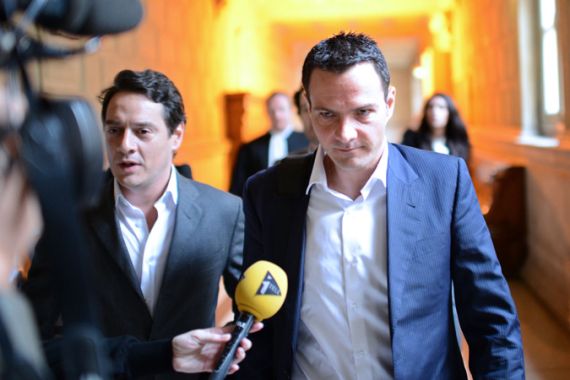French ‘rogue trader’ launches appeal
Jerome Kerviel, who faces five-year prison term, rejects responsibility for bets that caused 4.9bn euro loss at SocGen.


Societe Generale’s lawyers told the court on Monday that individual traders were responsible for staying within their limits [AFP]
Jerome Kerviel has begun his appeal against sentencing for his role in what is France’s largest rogue-trading scandal to date, arguing he was not responsible for a 4.9bn euro ($6.1bn) loss at the banking group Societe Generale.
Showing little emotion in a Paris court on Monday, Kerviel, 35, hit back at SocGen over the 2010 conviction that held him responsible for massive, risky bets uncovered in 2008.
Keep reading
list of 4 itemsEcuador weighs security, international arbitration in latest referendum
‘Triple spending’: Zimbabweans bear cost of changing to new ZiG currency
Boeing hit with 32 whistleblower claims, as dead worker’s case reviewed
Kerviel claims his superiors knew what he was doing, but SocGen denies any part in the trades.
“I am not responsible for this loss … I always behaved according to the rules set by my superiors,” he said.
At stake for SocGen is whether magistrates will once again exonerate the bank of any responsibility for Kerviel’s trading positions, which dealt a big blow to its reputation and forced it to raise capital.
Kerviel portrayed SocGen as having imposed little oversight on its traders, saying he was never told what his official remit was and that his desk regularly flouted its 125 million euro limit.
“My mandate was to make money for the bank,” he told the court.
Kerviel also said he had signed, but not read, a book of guidelines for traders at the bank, saying: “It was worthless”.
SocGen’s representative in court said his roles in market-making and arbitrage were clearly defined and that individual traders were responsible for staying within their limits.
On the offensive
Armed with a new counsel, David Koubbi, who is known for defending high-profile celebrity clients such as actress Isabelle Adjani, Kerviel has already gone on the offensive in advance of his month-long appeal.
He has filed two cases accusing SocGen of obtaining a verdict under false pretences and of tampering with evidence.
The new allegations, which SocGen has denied and has responded to with countersuits for defamation, seek to shift the focus back on to the bank by accusing it of concealing information – such as its tax write-off on Kerviel-related losses – and of responsibility for alleged “blanks” on tapes used as evidence.
Kerviel was not questioned on these allegations during the appeal’s opening session.
“We will seek acquittal, there’s no mystery about that,” Koubbi said during recess. He dismissed SocGen’s
testimony as “false”.
The reappearance of Kerviel is the latest reminder of the potential costs to banks of risky trading activity, coming
after JPMorgan recently announced a $2bn trading loss. Such events have encouraged regulators on both sides of
the Atlantic to cast a sharp eye on bank practices.
The other shadow looming over the sector is political. With France’s new Socialist government threatening to separate banks’ risky activities from their retail operations, French banks have been insisting they do not do overly risky proprietary trading.